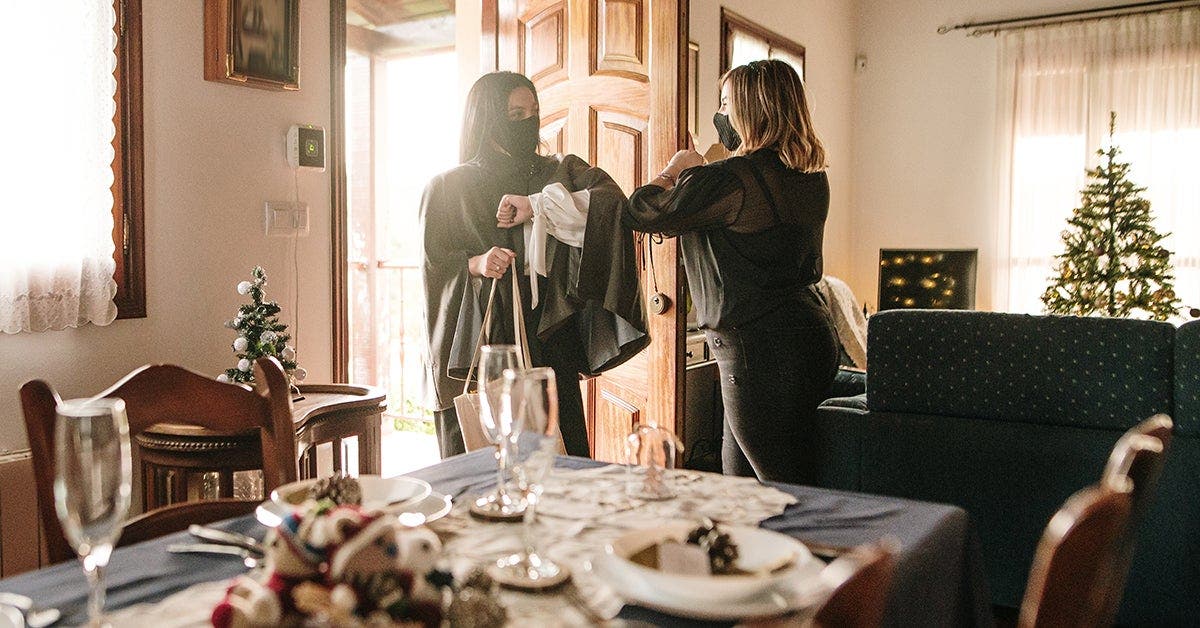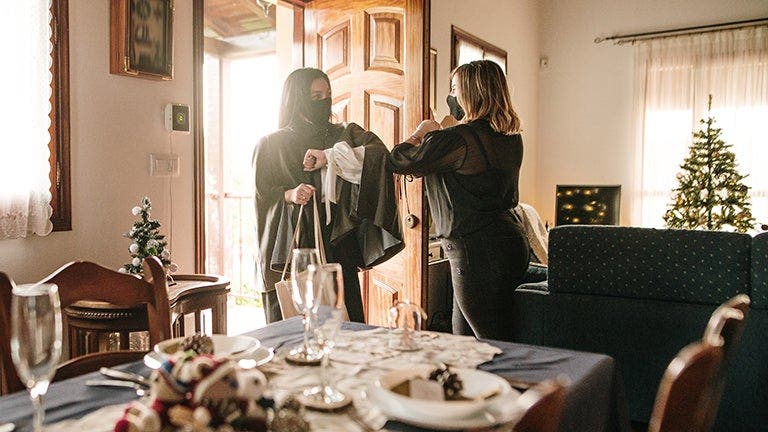COVID-19 holiday safety: How to manage plans with friends and family


Plenty of us are feeling more stressed than usual this holiday season. A November 2020 survey estimated that six out of 10 Americans would be upending their holiday plans because of the pandemic. Balancing safety with pressures to see family and friends can be challenging. But by identifying where our comfort levels lie—and asserting our boundaries around activities that may affect the health of ourselves and others—we can make that challenge more manageable.
The Centers for Disease Control and Prevention (CDC) maintains a list of frequently updated guidelines for holiday travel and social gatherings, including recommendations regarding face coverings, social distancing, group sizes, and more. Still, navigating safety precautions with family and friends can be tricky when levels of risk tolerance vary within a group. Below, a relationship expert offers a four-step approach for managing holiday gatherings during the pandemic in a way that minimizes stress, prioritizes your sense of personal safety, and helps keep the focus where it belongs: on sharing joy this holiday season.
1. Figure out your comfort zone
Before having a convo with loved ones, think through which holiday activities you feel comfortable participating in and which may feel off-limits for you this year, advises family therapist Raffi Bilek, LCSW-C, director of the Baltimore Therapy Center.
For example, you might be OK with a socially distanced backyard campfire but uneasy at the prospect of gathering in an enclosed tent with others. Or maybe you can tolerate the risk of being indoors with a small group, but only if everyone wears masks and agrees to self-isolate for 14 days afterward.
Your interpersonal boundaries deserve some consideration, as well, Bilek notes. For example, would you be comfortable hugging extended family members whose social-distancing habits are unknown? Are there heated topics you’d rather not discuss? (Maybe you don’t have the mental energy this year for your usual political sparring with your uncle.)
Having clarity on your comfort levels beforehand can reduce the odds you’ll give in to pressure from others—as well as help you avoid heated conversations—on the big day. Says Bilek, “When you know in advance where your limits lie, you have a better shot at effectively handling a situation that challenges those limits.”
2. Communicate your needs in advance
Explaining your comfort level to loved ones before a holiday event may help them better navigate your limits the day of, Bilek says. In many cases, a heads up can prevent others from interpreting boundaries as an abrupt form of personal rejection, Bilek says.
This could mean calling, texting, or writing an email to friends and family explaining that you love them dearly and are looking forward to celebrating the holidays with them in a way that supports your sense of personal safety. Then, explain your limits: You might note, for example, that you won’t be extending hugs at this year’s festivities. Or that you look forward to joining the family on Zoom instead.
If you’re hosting an event, be sure all guests are fully briefed on the details so everyone can make an informed personal decision about how best to approach the day. For example, will guests be gathering indoors? Will the meal be served buffet-style? What are the “house rules” concerning face coverings?
One key in effectively communicating personal needs and boundaries is to couch them as a matter of, well, personal comfort, Bilek says. Understand that you and certain loved ones may not see eye to eye on what’s “right” and “wrong” concerning COVID-19 safety.
“Pointing out the science, statistics, or what medical professionals are advising may be factual and objective, but it can put people on the offensive,” Bilek explains. “Framing your preferences as personal is harder to argue with—and feels to the listener less like you’re moralizing or talking down to them.”
3. Be flexible and have a plan B
The nature of the coronavirus pandemic means that circumstances can change suddenly. Bilek says a sense of openness around a holiday backup plan can be helpful if you’re faced with a last-minute shift—for example, if you or a loved one starts to feel ill days before a planned event, or if regional travel restrictions tighten in response to spikes in COVID-19 cases.
“A plan B can help mitigate disappointment when things don’t go as expected and give you something else to focus on,” Bilek says. That could mean arranging a virtual hangout for loved ones who need to cancel at the last minute, inviting friends and family for a virtual holiday movie screening (hot tip: Teleparty enables multiple Netflix subscribers to stream content simultaneously from different locations), or arranging to sing festive songs outside the window of a cousin who is self-isolating while awaiting COVID test results. And hey, who knows? Sometimes a creative alternative can be more fun than the original plan. The trick is to stay flexible and open-minded.
4. Accept what you can’t control—including others’ opinions
Some people may be upset by our safety precautions no matter how lovingly we frame them. Acknowledging and validating those emotional responses sometimes can help, Bilek says; just know that you need not apologize for prioritizing your needs. Try a line like, “I see you’re hurt that I won’t be able to make it to our traditional holiday extravaganza this year, and that makes sense—I’m bummed to be missing it, too!”
Consider also that others may react to our limits from a place of heightened stress or sadness about feeling isolated from loved ones, Bilek adds. Holding that in mind can help keep your conversations in an empathetic zone. Ultimately, though, we may have to make peace with the fact that certain people in our lives won’t approve of our choices, Bilek says.
Boundaries are crucial aspects of self-care that help us build and maintain healthy relationships. Give yourself credit for identifying and articulating yours. And remember: It’s OK if you’re not always able to please everyone in your life—a valuable lesson to carry forth now and after the pandemic passes.
Note: Public health recommendations concerning COVID-19 continue to evolve as researchers learn more about the virus and its effects. The information in this article might not reflect the latest guidelines. For up-to-date information on COVID-19, visit the CDC website.
--
Katherine Schreiber, MFA, LMSW, is a social worker and freelance journalist in New York City. She is the author of The Truth About Exercise Addiction: Understanding the Dark Side of Thinspiration. Follow her on Twitter @ktschreib.
--
This article was reviewed for accuracy in July 2021 by Allison Grupski, PhD, senior director for behavior change strategies & coaching at WW. The WW Science Team is a dedicated group of experts who ensure all our solutions are rooted in the best possible research.
Related articles
- A mindful approach to holiday stress
- Expert advice for 6 kinds of anxious thoughts
- How to renew your spirit when you’re emotionally exhausted
